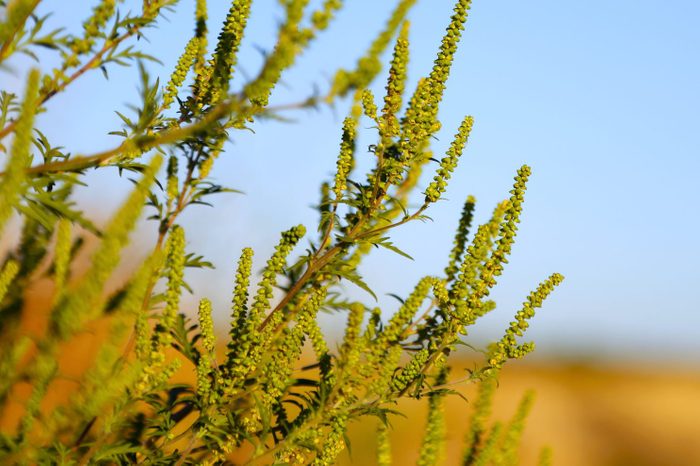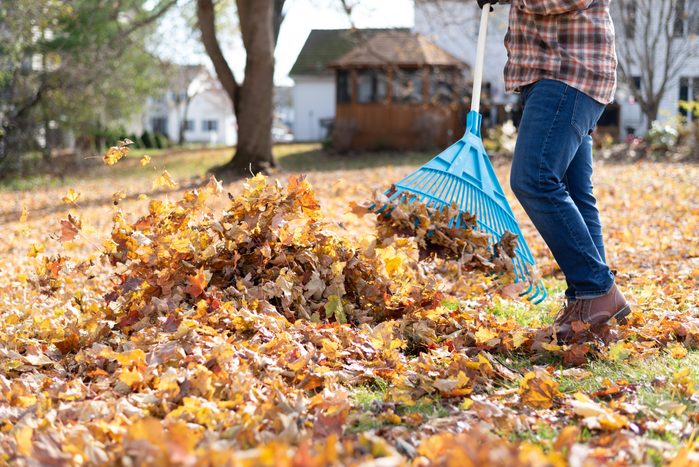
While most would associate springtime with allergy season (the only downside of blooming trees!), spring isn’t the only season to cause unpleasant allergic symptoms. If you find that your allergies are particularly awful in the fall, you may actually be dealing with a weed pollen allergy. The Healthy @Reader’s Digest spoke with Dr. Andrea Burke, MD, a New York City-based board-certified allergist/immunologist, about what’s causing your fall allergies and how to manage them.
“Various plants release their pollen at different times throughout the year,” Dr. Burke says. “This will depend on where you live, but springtime is when most trees pollinate, and the late summer and fall are when weeds pollinate. The most well-known is ragweed. There are other weeds that can cause allergies, such as lamb’s quarters, mugwort, pigweed, and sagebrush. These plants rely on the wind to disperse their pollen. So dry, windy days are going to be when people with allergies suffer the most!”
Here are a few tips from Dr. Burke on how to manage your fall allergies if you sniffle, sneeze, and scratch your way through fall.

Keep your windows closed
That crisp air can be wonderful. Unfortunately, keeping the windows open—whether that’s in your home at night, or having them down when you drive in the car—can put you in direct contact with the pollen in the air that is causing your discomfort.
Instead, to keep air circulating, Dr. Burke recommends using air conditioning, which “cleans, cools and dries the air.”
Do Air Purifiers Work? A Guide to Air Purifiers and How They Work

Stay indoors when the pollen count is high
Some days may be easier to handle being outside compared to others, and that may be due to the amount of pollen that’s circulating in the air. Dr. Burke says an easy solution to manage your fall allergies is to avoid going outside of the pollen count is particularly high that day. You can take a look at the pollen forecast for your region to determine what the day is looking like, and even what the top allergens are currently in the air.

Remove the pollen when you return home
If you did venture outside and found the day to be relatively OK, you may still have those allergens on your clothes and even in your hair. If your allergies are particularly harsh during the fall months, it may be wise to change your clothes and even wash your hair after being outside to ensure you aren’t spreading that allergen throughout your home.

Avoid being responsible for mowing lawns or raking leaves
Finding that throwing dead fall leaves in the air isn’t as magical as others make it seem? You might be dealing with a mold allergy that is coming from dead debris.
“In the fall, as deciduous trees drop their leaves and there’s more rain, molds will grow,” says Dr. Burke. “Some molds are released on wet, rainy days, others can be spread around on dry, windy days. Mold is a common allergen and people may notice these allergies in the fall season if they live in an area where there is more decaying plant material on the ground.”
14 Health Effects of Mold in Your Home, from an Air Quality Scientist

Wipe down your pet’s fur to manage fall allergies
Pet hair and dander can easily be culprits for bringing in fall allergies. Dr. Burke recommends wiping down your pet’s fur before they come inside. (Cleaning their paws might not be a bad idea, either!)
Even if you don’t have a pet but your child seems to be suffering this season, here’s one more possible explanation: “Another common allergy that brings patients into my office in the fall has less to do with the season changing, and more to do with kids going back to school,” Dr. Burke says. “Children who are allergic to animal danders may experience a flare in their symptoms when they return to the classroom. This is because their classmates who have pets at home carry the pet hair and dander on their clothing.”

Certain foods can trigger fall allergies
“Fun fact! Some people who are allergic to weed pollen may find they get an itchy mouth when eating melons (such as cantaloupe, honeydew, or watermelon), fresh carrots, or even mustard seeds,” says Dr. Burke. “This is known as Oral Allergy Syndrome and happens as a result of proteins in these foods that look like the proteins in pollen.”
So if you find a weed allergy is causing your fall allergies, consuming these foods could also create allergic-like symptoms. To confirm if you are dealing with a particular allergy, you can always set up an appointment with your local allergist for a proper test and diagnosis.

Try over-the-counter medications to manage fall allergies
Dr. Burke does recommend a few over-the-counter medications if needed to manage your fall allergies. These include:
- Allergy eye drops: for itchy, red eyes
- Saltwater nasal rinses and sprays: to rinse out the allergens and mucus
- Nasal corticosteroids: help reduce allergic inflammation and swelling in the nose
- Antihistamine tablets: helps with itching, sneezing, and nasal congestion
She also recommends a few prescribed medications for allergies, including Montelukast and inhalers for asthma. To ensure these are the right medications for you, be sure to talk with your doctor.
For more wellness updates, follow The Healthy on Facebook, Instagram, and Twitter. Keep reading:
